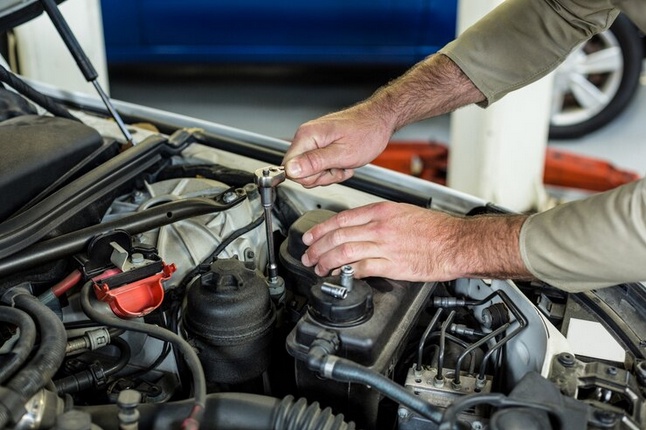Introduction
The automatic transmission is a vital component of any vehicle, responsible for smoothly shifting gears and transferring power from the engine to the wheels. To ensure its proper functioning and longevity, regular maintenance is essential. One crucial aspect of maintenance is the automatic transmission fluid change. In this comprehensive guide, we will explore the importance of ATF change, its benefits, and the recommended frequency for this service. By understanding the significance of ATF change and following the guidelines provided, you can protect your vehicle's transmission and avoid costly repairs.
1. What is Automatic Transmission Fluid (ATF)?
Automatic Transmission Fluid (ATF) is a specialized lubricant that serves multiple functions within the transmission system. It acts as a hydraulic fluid, providing the necessary pressure for gear shifting. ATF also lubricates the various components of the transmission, reducing friction and preventing wear and tear. Additionally, it helps to cool the transmission by dissipating heat generated during operation.
2. The Importance of ATF Change
Over time, ATF can become contaminated with debris, dirt, and metal particles. This contamination can negatively impact the performance and longevity of the transmission. Here are the key reasons why ATF change is important:
2.1. Maintains Optimal Performance
Regular ATF change ensures that the transmission operates at its best. Fresh, clean ATF provides the necessary lubrication and hydraulic pressure for smooth gear shifts and efficient power transfer. Neglecting ATF change can lead to sluggish shifting, decreased fuel efficiency, and potential damage to the transmission.
2.2. Prevents Costly Repairs
By changing the ATF at the recommended intervals, you can prevent costly transmission repairs. Contaminated ATF can cause increased friction and heat, leading to accelerated wear and tear on transmission components. Over time, this can result in transmission failure, requiring a complete overhaul or replacement, which can be a significant financial burden.
2.3. Extends Transmission Lifespan
Regular ATF change helps extend the lifespan of the transmission. Clean ATF reduces friction and wear on internal components, minimizing the risk of premature failure. By investing in routine ATF change, you can maximize the longevity of your vehicle's transmission and avoid the need for expensive repairs or replacements.
3. Recommended Frequency for ATF Change
The recommended frequency for ATF change varies depending on the make, model, and driving conditions of your vehicle. It is crucial to consult your vehicle's owner's manual or contact a trusted mechanic for specific recommendations. However, as a general guideline:
- For most vehicles, ATF change is recommended every 30,000 to 60,000 miles or every 2 to 4 years, whichever comes first.
- Vehicles used for towing, heavy-duty driving, or in extreme temperatures may require more frequent ATF changes.
It's important to note that some newer vehicles may have sealed transmissions that do not require regular ATF changes. In such cases, the manufacturer's recommendations should be followed.
4. Signs that ATF Change is Needed
While following the recommended frequency for ATF change is crucial, there are certain signs that indicate the need for immediate attention. If you experience any of the following symptoms, it's advisable to have your ATF checked and changed if necessary:
- Slipping or delayed gear engagement
- Rough or erratic shifting
- Transmission overheating
- Unusual noises or vibrations during gear changes
- Burnt or discolored ATF with a foul odor
If you notice any of these signs, it's essential to have your vehicle inspected by a qualified mechanic to determine the cause and take appropriate action.
Frequently Asked Questions (FAQ)
Q1: Can I change the ATF myself, or should I take it to a professional?
A1: While some experienced DIY enthusiasts may choose to change the ATF themselves, it's generally recommended to have it done by a professional. A professional mechanic has the expertise, tools, and equipment to perform the service correctly and ensure the use of the appropriate ATF for your vehicle.
Q2: What happens if I neglect to change the ATF?
A2: Neglecting ATF change can lead to various issues, including decreased performance, reduced fuel efficiency, transmission slipping, and potentially costly repairs or even transmission failure.
Q3: Can I use any type of ATF for my vehicle?
A3: No, it's essential to use the ATF recommended by the vehicle manufacturer. Different vehicles require specific types of ATF to ensure optimal performance and compatibility with the transmission components.
Q4: Can I change the ATF more frequently than recommended?
A4: While more frequent ATF changes may seem beneficial, it's generally unnecessary and can be a waste of resources. Following the manufacturer's recommended intervals is typically sufficient for maintaining a healthy transmission.
Q5: Is it possible to overfill the transmission with ATF?
A5: Yes, overfilling thetransmission with ATF can cause damage. It's crucial to follow the manufacturer's guidelines and recommendations for the correct ATF level. Overfilling can lead to excessive pressure, foaming, and potential leaks.
Conclusion
The automatic transmission is a complex and vital component of your vehicle. Regular maintenance, including the timely change of automatic transmission fluid (ATF), is crucial for its optimal performance and longevity. By understanding the importance of ATF change, following the recommended frequency, and paying attention to signs of potential issues, you can protect your transmission from costly repairs and extend its lifespan. Remember to consult your vehicle's owner's manual or a trusted mechanic for specific recommendations and always use the recommended ATF for your vehicle. With proper care and maintenance, your automatic transmission will continue to provide smooth and reliable performance for years to come.


No comments yet